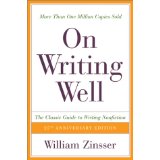Originally published January 26, 2013
On Writing Well, by William Zinsser. Available for under $10.00
So, for a bit of a twist I thought I would share a book review today; a how-to book. I know that not all my fans think of themselves as writers. We are. Every last one of us writes for one reason or another. Tweets, text messages and dashed-off comments on social networks are becoming the norm and are probably doing serious damage to our ability to effectively communicate in our mother tongue. Somewhere in life you, yes you, will be required to write. Business communications, customer relations, organization news and inquires, marketing and magazines, internet and newspaper articles. We still communicate through the written word. On Writing Well is just the book to help you write better whatever the medium or the goal. Whether it is emails, memos, official letters or brochures, or even books, this is a delightful reference to keep near.
Within the pages of this book, Zinsser provides a well balanced mini-writing course. He talks about simplicity, clutter, style, your voice and how to develop it, grammar and word usage. He also presents ideas and examples of different types of nonfiction. How do you conduct an interview? What makes a good travel log? How do you write a memoir? How do you write about science and technology if you are a professional, or if you’re not? How can business people and members of institutions write clearly to convey a message and sound like someone you might actually want to call if you have a question?
What is fun about this book is that Zinsser uses stories from his own career, both as a professor and as a writer, in order to illustrate his points. He also uses his own writing style to show you what feels comfortable and conveys an intended thought; and what leaves you wandering all over the page trying to figure out how you got there. He shares some of his own proofs and indicates the changes he made.
Zinsser also speaks to humanity in writing. He shows you how to choose the correct voice for the occasion. A lover of clear, uncluttered language, he provides an example from the Roosevelt administration. When asked to write a memo about the blackout orders of 1942, a staffer presented this:
Such preparation shall be made as will completely obscure all Federal buildings and non-Federal buildings occupied by the Federal government during an air raid for any period of time from visibility by reason of internal or external illumination.
The President responded with: “Tell them that in buildings where they have to keep the work going to put something across the windows.”
Zinsser further illustrates “clutter” with this bit of humor:
It’s the language of the flight attendant demonstrating the oxygen mask that will drop down if the plane should run out of air. “In the unlikely possibility that the aircraft should experience such an eventuality,” she begins–a phrase so oxygen-depriving in itself that we are prepared for any disaster.
So, with samples, humor, stories from his own career and a smattering of examples from published works; Zinsser takes you by the hand and leads you to the land of communication. A land that the reader will want to visit because what you write is what you meant to say.



No Comments